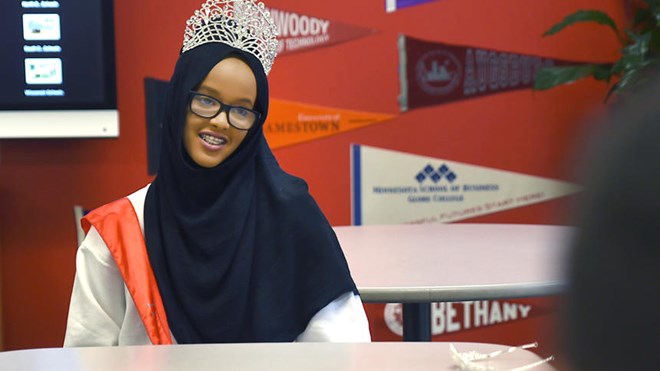
Sunday, October 02, 2016
By Linda Vanderwerf

Briana Sanchez / Tribune Anisa Abdulahi talks Friday with other members of the homecoming court at Willmar Senior High School. Abdulahi says she was very humbled to be crowned homecoming queen.
WILLMAR — To her classmates, Anisa Abdulahi deserved to be elected Willmar Senior High's homecoming queen because she's so nice, and everybody likes her.
The other members of her royal court recognize she's the first Somali-American homecoming queen, but they pay more attention to the type of person she is.
Anisa was crowned Monday evening, along with homecoming king Grant Duininck. They were elected by the entire student body after seniors chose the candidates.
For Riley Schneider, the homecoming princess, "I didn't think about it that much; I thought Anisa deserved it most out of anyone, because she is so amazing."
Grant said he was happy when Anisa was named queen. "It was kind of a unique situation that no other class has had before, and it was the opportunity that we had."
The students said attention given to the diverse homecoming court could help show the world what Willmar's schools are like.
The Senior High has had Hispanic students in its homecoming court in the past and this year. Anisa was the first Somali ever nominated. The student body is 57 percent white, 23 percent Hispanic, 18 percent black and 2 percent Asian.
The relative lack of racial strife in Willmar's schools stands in contrast to reports of problems with Muslims or other minorities around the state and country.
"From the outside, it looks kind of cool for other schools to see," said Sophie Schmitz, one of the queen candidates. "This is Willmar; this is what we represent; this is what we have."
School counselor Sharon Tollefson enjoys working with Willmar's diverse student body. "This generation, I don't think, sees race and color like in the past," she said. "It's a nice atmosphere here, a nice culture; I just feel I learn a lot from the kids I work with."
So, what makes Willmar different?
Manny Obregon, a king candidate, said students are friendly with everyone. "No one's afraid to intermingle with other groups of people," he said.
The students said their parents and adults at school have set a good example.
School leaders have shown students they don't have to segregate and stay away from people who aren't just like them, said Tyler Johnson, the homecoming prince.
Sophie agreed the school staff has played a big role in acceptance at the school. "They show us the way," she said. "They're all so accepting and all so kind to everyone, it carries over to the kids."
Being around people from other ethnicities just feels normal, she continued. "It's more of a privilege than anything to be exposed to this huge diversity right in Willmar."
Manny added that in the overall community, "most people are accepting of everyone."
The students said their class of 2017 does a good job of mixing together. "I think we do a great job of including everyone," said Riley.
Anisa's family moved to Willmar when she was a third-grader, and the schools have been a welcoming place.
"I feel like they don't judge you on your color, on your race or religion or where you came from," she said. "They treat you the way they would want to be treated."
She felt good when she was crowned, she said. "I think it says a lot. Being the first Somali girl, I think, is huge."
It's good for students to have a chance to get to know each other, because "you're able to realize that they're awesome just because of who they are," Tyler said. " ... Maybe they're funny."
High School Principal Paul Schmitz said people who aren't connected to the schools may not realize "it's just what's normal" for kids who have gone to school together for years.
Students of all backgrounds rise to prominent positions in the school, Schmitz said. "To me, it isn't a surprise; it just seems like a natural progression. That's just the way our school is," he said.
Students recognize the cultural and racial backgrounds of their classmates but "they really see each other as individuals," Schmitz said.
The school has great "diversity within our diversity," he said, with minority students at all academic levels, from learning basic English to taking college prep classes.
If the boys soccer team — one-third each white, Hispanic and Somali — can get along, the adults should be able to figure it out, too, he added.
"Because we have so many good role models in the kids, you could hardly get away with saying something derogatory toward another person with a disability or because of their race in the middle of the cafeteria," he said. "The other kids would step up, and I don't even think we'd need the adults to say anything."